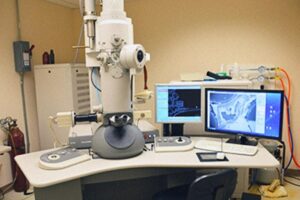IU School of Medicine Center for Electron Microscopy (iCEM)

Affiliation:
IU School of Medicine, IU Indianapolis
Director:
Quyen Hoang
Program Manager:
Mandy Bittner
Website:
Description:
The Indiana University School of Medicine Center for Electron Microscopy (iCEM) is a full-service research laboratory providing Cryo-EM and Transmission Electron Microscopy. iCEM can provide the technical services to help design and then implement experiments needing each type of microscopy. The services provided can apply both traditional methods and more recent technical developments to suit the investigator’s needs.
Policies:
Services:
- Cryogenic Electron Microscopy (Cryo-EM). ThermoFisher Glacios Cryo-TEM equipped with Falcon 4 detector. When finished, the center will provide a full range of cryo-EM services for structure determination, including grid preparation (glow discharge), sample/grid freezing with the Vitrobot, grid/sample screening on the Glacios, and data collection on the Glacios. We will also provide cryogenic grid shipping equipment for transporting grids to Purdue for additional data collection on the consortium Titan Krios G4. Collaboration with staff scientists will be available for data processing and reconstruction.
- Immunocytochemistry. This would include processing of specimens with a special fixative and embedding resin used for immunostaining, thick and thin sectioning, the immunostaining process, primary antibody provided by the researcher, and secondary antibody provided by iCEM. Viewing and imaging on the microscope
- Transmission Electron Microscopy (TEM). ThermoFisher, Tecnai, Spirit, (Hillsboro, OR) equipped with an AMT (Advanced Microscopy Techniques, Danvers, MA) CCD camera. Routine processing of specimens, fixation through embedding. Thick and thin sectioning with staining. Viewing and imaging on microscope. Various specimen types accepted, from tissue pieces to cell cultures either as a monolayer or cell pellet. Negative staining can be done on various specimens, such as virus, bacteria, exosomes or even hallosite crystals in clay.
- Grid Micropatterning and Cryo-ET: This service enables CTSI-affiliated researchers to preserve in vivo cellular morphologies of cells grown in culture. This is made possible by a process called cellular micropatterning, which combines the cutting-edge capabilities of the Rapid Automated Modular Microscope (RAMM) inverted light microscope with the innovative features of the Alvéole Primo 2 Micropatterning System. This is a game-changing technology in that previously intractable cellular interactions can now be imaged with nanometer resolution with iCEM’s conventional EM service or near atomic resolution with cryo-electron tomography (cryo-ET).
Contact:
- Mandy Bittner : mabitt@iu.edu (317) 274-4371